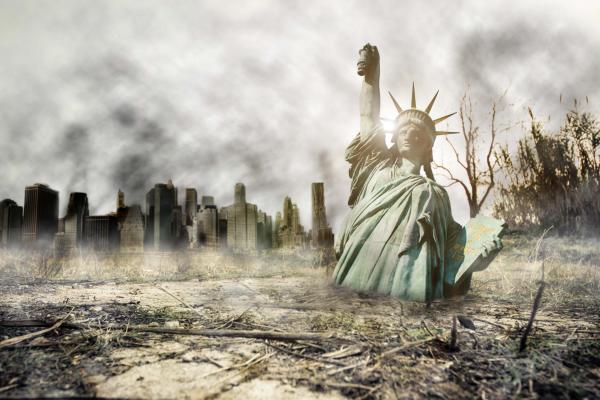There is an empty tomb in Jerusalem, at the Church of the Holy Sepulchre in the Christian quarter of the Old City. It is likely not where where Jesus was buried, any more accurate than – across from the church – a cross that marks historical Calvary. This does not matter. Orthodox priests burn candles by it; women fall to their knees; people kiss icons and hold holy basil and weep. The stories of Jerusalem are contradictory and jumbled. People kiss icons everywhere, anyway.
This week, Trump’s victory represents the triumph of another narrative, one no less powerful. As the members of the upper echelons of power close rank, as they inevitably do, we are left with the challenge of contending with an explosive expression of rage: an apocalyptic call to “drain the swamp” that, regardless of what happens in Washington, will echo throughout the next four years.
It is easy to use the language of the alt-right, the discourse of “pure egoism, nihilism, and destruction” associated with language around the “black pill,” that characterizes a hopeless arc of history toward its annihilation: a will on the part of voters toward meaningless destruction. It is not. If anything, it is what we might call mythic nihilism — a will to destruction that takes on a quasi-religious significance. A savage chaos that is, in fact, loaded with meaning.
It is the narrative — Dionysian, Nietzschean, Wagnerian, and also prevalent in the jeremiads of the Old Testament — that we must burn everything to the ground in order to rebuild it. It is messianic and apocalyptic: Seeming meaninglessness — economic deprivation, social conflict, denatured masculinity — rendered sensible. It is a narrative of rampart-smashing, one easy in which to take a kind of perverse pleasure — a destruction with primal codes of meaning. It is the kind of aestheticization of experience Walter Benjamin describes when he writes about a society whose “self-alienation has reached such a degree that it can experience its own destruction as an aesthetic pleasure of the first order.” Divorced from a sense of meaning, we hunger for anything that can give us one: even the end.
There’s a passage in anthropologist Claude Levi-Strauss’s Structural Anthropology where he writes about a South American shaman at the bedside of a pregnant woman, who recites the story of warring gods in her belly as she suffers. He gives her pain meaning; she suffers less. He explains what is happening inside her in terms that mean something; she can wager on that meaning.
So too this week.
The act of voting for Trump was not necessarily an expression of faith — “Make America Great Again” — so much as a furious and violent liturgy: a people in search of a story to tell about their role to play at the end of the old order, perhaps the end of the world. It’s an apocalyptic urge. Michael Moore was prescient when he predicted Trump’s win as a “giant ‘f*ck you.’”
At other moments, moments of particular frustration and fury, I have found myself more like many of the angriest Trump voters — irrationally but ecstatically welcoming the chaos Trump has coded into his campaign. Fine, I have said to myself, at 3 o’clock in the morning. Yes, you were right, the world is burning — so let it burn.
This, of course, is a narrative, too.
I have sought meaning at the end of the world. I have wanted to be part of the apocalypse, because it is preferable to being part of a stage in history that means absolutely nothing.
To be a Christian, in some sense, is to wager on meaningfulness. There is a God; there is a world God has created; it is good. Yet at Christianity’s heart, there is also a battle, a Chaoskampf against meaninglessness. The story at the heart of our shared faith of a man — an incarnate, human, existing, bleeding God — who suffers on a cross, who cries in his final moments, “Why hast thou forsaken me?,” and who does not know the answer. It is the story of an empty tomb in Jerusalem. It is the story of absence, as much as presence, and of the will to wager against the darkness anyway.
It is the story of an Abraham who “absurdly” — to use Kierkegaard’s language — prepares to sacrifice Isaac and yet trusts, no less absurdly, that he shall not lose him; of a Christ who — as in Dostoevsky’s Brothers Karamazov — hears the unassailable arguments of a hyper-rational Grand Inquisitor and does nothing in reply but kiss him silently on the lips.
So what happens now?
If we have learned anything from the elections, it is that we hunger for narrative, and that narrative will destroy us. Accounts of zeitgeist, of historical moments, of historical endings, explain. But they do not answer.
The work ahead is not essential. It is existential. It is unglamorous. It has no cowboys and no Messiahs, as much as I wish to God it did. It is the work of being-in-the-world.
We must contend with, maybe even embrace, the pain and the rage and the brokenness of the world — racism and misogyny and cruelty and meaninglessness and the same hunger that makes the end of history, the great narrative “f*ck you,” such an appealing aesthetic option for people who have voted for Trump. We must look flint-eyed on brokenness without sentimentality. We must allow, even embrace, that rage, and allow it to be our own, too.
And we must allow for the absence of answers for them.
We must not cloister ourselves in cheap salubrious narratives of resistance — one that begins and ends with safety-pins (though they may have their place) or with Facebook solidarity or that cosset us with Buzzfeed images of Joe Biden hiding the nuclear codes from Donald Trump. We must not cast ourselves in the roles of brave Hogwarts heroes fighting against Voldemort. We are not. Those narratives are no less cheap and illusory than those across the chasm of politics.
As members of the left, we find ourselves wanting meaning, now, no less than did those who voted to Make America Great Again. We want a theodicy. We want answers. We want, in a sense, a religious explanation for how to proceed next.
It would be intellectually satisfying to come up with new narratives. It would also be lazy.
As Christians, what we are called to do is sacrifice that. We go on living. That’s it. We donate, if we choose to; we participate, when we can, in acts of goodness and solidarity and defiance; we rage against racism when we see it; when men grope women on subway platforms we follow the women to comfort them, as happened to me earlier this week. We do dull, good things, and we vote. We love, but do not soothe ourselves with the softness of that love. We deconstruct our own narratives, especially when they make us feel good.
We cry out in the wilderness. But we do not expect answers — not yet, and maybe not ever. If we are called to anything, now, it is to do the work of living without them.
Got something to say about what you're reading? We value your feedback!

